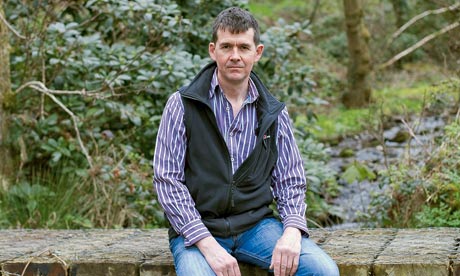
My life changed beyond recognition at the age of 35. I was born 50% deaf in both ears and, until then, I thought that having to wear hearing aids was all I had to deal with. It hadn't held me back – I had a successful career as an environmental health manager in London. But my world was totally transformed when I was diagnosed with Usher syndrome, an inherited condition combining deafness with deteriorating vision and eventual blindness.
It was my wife Elizabeth who first noticed there was a problem. She was training to be an osteopath and used me as a guinea pig for a peripheral vision test. She moved a pencil past my face and was shocked to discover I couldn't see it unless it was directly in front of me. My eyesight had been failing for years but I simply hadn't noticed. I had unconsciously adapted to my decreasing field of vision by moving my eyes more.
The eye specialist who broke the news to me was very brutal. A medical student with him was struggling to spot my condition. "Think, man, it's what makes you go blind!" he barked at him. And that was how I found out my fate. After the diagnosis, I couldn't imagine how my life could get any worse, but in fact it has improved immeasurably.
Of course, coming to terms with it was hard initially. My first reaction was denial, followed by severe depression. I had built effective coping strategies to deal with my hearing loss; losing my sight, too, just felt too much to handle. You absorb so much information about the world through your eyes, so the idea of that being taken away was terrifying. I spent several days on the sofa, feeling desolate. After my diagnosis came redundancy, too. I felt all my options were diminishing.
But I am very positive and didn't wallow for long. I have seen some people react to the news by withdrawing from life, but I chose differently. I got off the sofa and decided to train as a homeopath. Looking back, I think this was a way of working through my problems.
Then, as Elizabeth and I weren't tied to London for work any more, we left to start a farm in rural Wales, which I combined with starting my own environmental health business. It was just what I needed: clean air, spring water and space. We decided to start a family, too (after genetic counselling), and now have twin girls, aged five.
So many wonderful things have happened since my diagnosis and now, age 50, I feel that I am living a second life.
Learning I had Usher syndrome was a very significant event and it has changed me. I have discovered forbearance; learning to live with something myself has made me so much more accepting of other people – everyone is struggling with something.
I have also become more intuitive and perceptive. My field of vision is currently 15 degrees – tunnel vision is an accurate description – so I can't rely on all the visual clues and body language that make up human interaction. Instead, I work hard at getting a sense of a person in other ways. Previously I was more egotistical; now I have amazing conversations where the barriers come down. I think my sight and hearing problems actually allow people to open up. Strangely, other people have a harder time coping with my condition than I do; it frightens them and I often find myself reassuring them.
Although I remain upbeat, I do worry there is more weight on my wife's shoulders now, because I can't help in practical ways such as driving, but our relationship is still very strong.
I avoided using a white stick for as long as possible, because I don't like the stigma of it, but now self-preservation means it's become a necessity. The prospect of being totally blind is something I am cogitating over. There's not much information out there about it – perhaps people don't want to have to think about it. It's a very emotive subject for me and Elizabeth, and not one we talk about much. It's an unknown, and who knows, I may cope fine. I'm not into bravado; I find a better strategy is to be steady and constantly inquiring.
Ultimately, I aim to remain active and engaged with life. I don't think of myself as disabled. Instead, I've got a few impediments and I've learned to live with them.
• As told to Emily Cunningham
Do you have an experience to share? Email experience@theguardian.com

